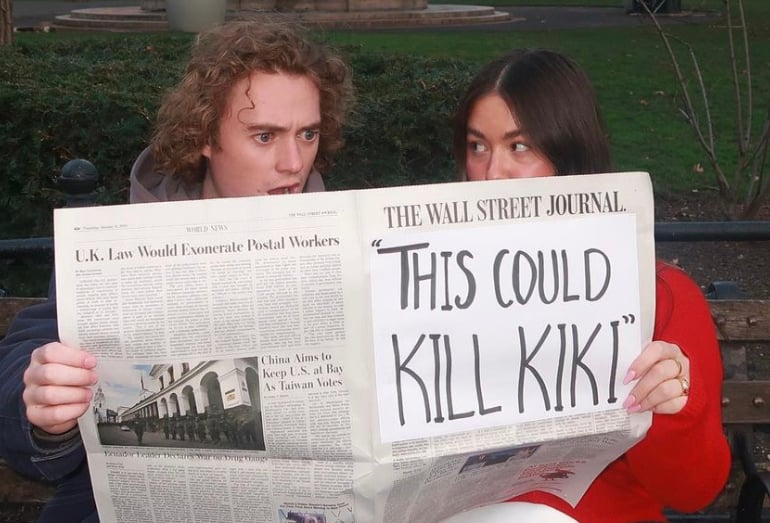Last year Blackbird Ventures made a massive bet on a New Zealand rental accommodation app, just six months after it had turned down a $200,000 pitch for cash.
In August 2023, Blackbird instead tipped $7 million into a A$9.5 million Seed round for Kiki.
The startup’s cofounder Toby Thomas-Smith, said Blackbird’s New Zealand partner, Samantha Wong, cried on the phone during the deal – the second largest cheque written by the VC and NZ’s biggest Seed round.
The blue chip cap table included former Airbnb exec Harry Uffindell, Facebook Marketplace founder Bowen Pan, former Bumble exec Michelle Battersby, and Phase One Ventures founder Mahesh Muralidhar, as well as former-Uber execs Tyler Trerotola and Jaikumar Ganesh, among others.
Last week, Thomas-Smith and his male cofounders abandoned their original concept of “the Tinder of subletting” to launch a “girls only club” called Girls Who NYC in New York.
The announcement went down as well as Peter Jackson’s debut film, Bad Taste, especially for many women struck with disbelief at what many saw as male hubris.
Meanwhile, for the third time, in a third country in five years, Kiki shut down what it said was a successful subletting business, for a pivot involving five male cofounders promising to help “girls not just survive but thrive”. Kiki needs to figure out how to not just survive but thrive too, since it doesn’t yet have a business model for the idea.
After starting life as EasyRent in October 2018, the business rebranded as Kiki Club last October to launch in New York. That adventure – the reason for the $9.5 million raise – lasted just a few months.
Operations in Sydney closed in early 2023, after a 12-month foray, having generated $350,000 in revenue over the year amid claims it was profitable. The original Kiwi business closed for the move to Sydney. It’s not often you see a fast-growing startup regularly shut down in order to succeed.

EasyRent rebrands on NZ TV in 2023. Source: Kiki/Istagram
Blackbird’s Samantha Wong expressed her belief in EasyRent/Kiki’s business model at the time saying: “This approach – putting people over property – helped overcome a behavioural inertia in Sydney that saw 2/3rds of their 1,500 matches sublet their home for the first time. And then once the first listing goes well, a new way of living becomes possible.”
The business sublet accomodation – short-term leases for a minimum of 1 to 3 months with an average of 6 weeks.
However, much like Uber in its early days up against taxis, subletting is a legally fraught space. It can be illegal from a government perspective and/or in breach of contract for a lessee, unless they get the property owner’s permission to sublet.
The Kiki team always brought a certain braggadocio to their endeavours, with a series of social media stunts reminiscent of Richard Branson’s Virgin playbook. Those attempts to grab attention pushed boundaries – often involving the cofounder in his underwear on TV or in public places.
You could view it as clever guerilla marketing. Or frat boy fratting. Or both.
Buying Airbnb
Thomas-Smith, 23, who spent two years at Airbnb as an accomodation manager, has big ambitions. He previously declared in an interview that by 2025 “Airbnb will try to buy us. And I’ll say ‘no, – we’ll buy you’.” Airbnb is currently worth around US$88 billion, more than three times Canva’s valuation.
In shutting down Kiki’s subletting business, Thomas-Smith said “it’s not like it isn’t working”, with around 100 properties sublet in NYC up to Christmas. That’s around 0.00125% of the city’s 7.9 million dwellings.
The problem, he outlined on Instagram, is that they were on the same growth trajectory as the now-defunct Sydney operation and people in New York are not making friends the way they did in the NSW capital.

Leveraging New York social media icon @dudewithsign during the New York marathon. Source: Kiki/Instagram
His take is that Kiki is all about creating community, recounting how people cry in his arms and customers ring him at 2am to say they’ve met their best friend via the platform.
It seems a lot of people cry around the Kiki cofounder.
Thomas-Smith said investor Mahesh Muralidhar was also crying when the Seed raise landed.
If investors are in tears now, it’s for different reasons.
Marketer and investor Jamie Verco said Kiki’s backers deserve their money back.
“So you start NZ. Shut it to go to Sydney. Start Sydney. It’s a “huge success” but you shut it down to go to NY. Start NY. Shut it to start a women’s safe space,” he wrote on Kiki’s Instagram announcement.
“Are you Serious? Consider giving the money back to Blackbird and other investors (I’m one) as this is looking like a joke.”
Bigger issues
The hopes of a startup valued at A$42 million after its Seed raise are now riding on the inspiration of its first female employee, Caitlin Emiko, 25, who joined them last year as Kiki’s sixth team member.
Her ability to make friends in the seven months she’s been in New York “enlightened” Thomas-Smith to the “huge problem” women face in hoping to lead their “best possible life” in NYC.

Girls Who NYC cofounder Toby Thomas-Smith announces his previous rebrand to Kiki. Source: Kiki/Instagram
Emma Bates, founder of NY startup Ask Diem, a social search engine for women, didn’t hold back in response to Kiki’s Instagram post, saying “the audacity… is highly problematic”
“While more men/male dominant industries (like tech & VC) do need to recognize the need for these safe spaces for women & girls to connect as HUGE (business) opportunities, building them with a male dominant team with only it seems (weeks?) of knowledge on this space is really alarming to me,” she wrote.
Another asked if, as part of Kiki’s new-found passion for women, if Emiko will be put in charge.
And not everyone of the New York 100 is a happy customer, it seems.
Following news of the shift, Emily Sandberg posted a Substack detailing the problems a friend who sublet her apartment on Kiki encountered, claiming the startup offered just $300 in compensation for $7000 worth of damage.
“What also surprises and concerns me is all of the comms have been conducted via Instagram DM — they refuse to take any back-and-forth to email or phone,” she wrote.
When the AFR revealed the pivot earlier this week, marketing guru and women’s equality advocate Cindy Gallop was typically blunt, saying “I cannot even begin to articulate how much my response to this is F*CK. THAT. SHIT. Every single line of this is ‘I can’t even’.”
In response, Michelle Schuberg, CEO of Sydney VR startup Curiious said Thomas-Smith was “a decent human” who’ll “look back on this and cringe”.
The bigger issue, she said “is the endemic accessibility of backing for the ill-conceived ideas of the Toby’s of the world when compared to female founders. It’s the exhausting reality for most female founders, but it does mean we are a buttoned down rigorous bunch, so in time the data will do the talking.”
‘Corporate girlies’
By the end of the week, Kiki’s public success story started wobbling under increased scrutiny like Jenga blocks pulled from a tower.
Late on Friday, Capital Brief’s Bronwen Clune published details of an investor memo from Thomas-Smith on Christmas Eve that suggests he’ll have more to cringe about.
It also paints a very different picture of the business for its backers. Like Flight of the Conchords, Kiki has struggled to find an audience in the Big Apple.
Thomas-Smith confessed that “we started with a bang but we’re only growing at the same rate as Sydney” and had “only filled 10% of [listings] due to mismatch in the marketplace, going too broad and seasonality.”
“The last 2 months have been a rollercoaster,” he wrote.
The cofounder’s message to investors was very different to last week’s Instagram post saying he’d been “enlightened” by Emiko, and was now going to offer young women “that life you saw in the movie on Friends and Sex in the City”.
He told investors, according to the email obtained by Capital Brief, that they’d pivot to “super niche persona of ‘corporate girlies’,” aged 25-28.
Focus on fundamentals
Before the investor memo emerged, Afterwork Ventures partner Jessy Wu offered a broader perspective, saying that she admired the “tenacity and ingenuity, and “zest and zeal” of Thomas-Smith and his team, and while she had concerns around their stunts and “workplace decorum”, there are deeper systemic issues at play.
“When it comes to safeguarding the safety and wellbeing of employees and other stakeholders, I don’t believe the tech sector is worse than other sectors. But it has its structural vulnerabilities. Among them is the fact that young founders—who are inexperienced people managers—are handed large sums of money and overnight assume the responsibility of hiring and managing a scaling team,” she wrote on LinkedIn.
“This is not a skill that is acquired overnight. And it’s the responsibility of investors and board members with more experience to guide founders on how to run their operations in a safe, mature, inclusive, and equitable manner.”

Kiki during its Sydney launch, seemingly unaware of NSW road safety laws. Source: Kiki/Instagram
Wu is one of the driving forces behind Grapevine and wants to focus on the fundamentals of business culture rather than “five boys making an eyebrow-raising business decision based on a nascent insight”.
“I do think there is an important story about how we can set ‘wild heart’ founders up for success – to capture attention without relying on ‘shocking’ tactics that destroy the protective cover of professionalism; to evolve into mature leaders of generational companies that solve real problems,” she wrote.
The Kiki team have not responded to media.
A spokesperson for Blackbird said:“Both Blackbird and the Kiki team recognise that Kiki’s recent social media post announcing its intention to build Girls Club NYC has regrettably caused frustration and in some cases, offence. The team understands the reaction this has caused and has taken on board all feedback.”
We’ll let Annie Parker, the former executive director of Sydney’s Tech Central and Microsoft global head of startups, have the final word.
But if you’re reading this out loud, best hit the mute button now.
“It’s 20-fucking-24 and we’re still here, a bunch of underwhelming young men can fail twice and still get funding for a third attempt at failure,” she said.
“It’s a terrible business idea, backed by utterly terrible founders. Here’s a shocking thought, if there was a need for a badass women’s club (they’re women – not girls dipshits) why not fund a badass woman to do it?”




















Trending
Daily startup news and insights, delivered to your inbox.